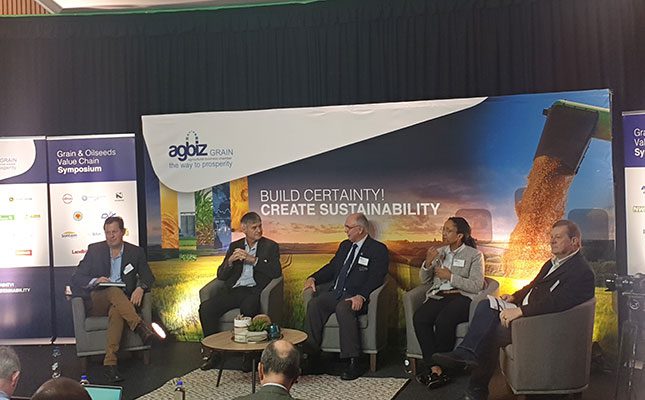[ad_1]
Access to available grain stock, the risk of volume concentration, price convergence and failing infrastructure were some of the challenges that were highlighted during the panel discussion of the second day of the Grain and Oilseeds Value Chain Symposium held in Pretoria.

Photo: Sindira Chetty
“The grain handling and storage sector is a vital role player in the greater grain and broader agriculture sector. It is therefore critical to ensure that the market functions optimally according to the set JSE rules.” With these thoughts, Wessel Lemmer, general manager at Agbiz Grain, opened the day’s discussions.
The panel comprised Chris Sturgess, business consultant, also acting as facilitator; Dr André van der Vyver, executive director of the South African Cereals and Oilseeds Trade Organisation; Derek Mathews, chairperson of Grain SA; Willie Dreyer, grain procurement manager at Pioneer Foods; Anelisa Matutu, senior commodity derivatives officer at the JSE; and Jerry Maritz, chairperson at Agbiz Grain.
Van der Vyver provided a trader’s perspective on the current challenges. He mentioned that up to 80% of all grain trade, including exports, went through silos at some point.
According to him, if challenges such as infrastructure and logistics are not addressed, they can hinder the movement of grain. “Infrastructure is one of the main challenges facing the industry. The deterioration of all infrastructure poses the biggest problems and is hindering grain handling. The conditions and lack of road and rail access have a major impact on the movement and export of grain. The infrastructure at ports are also not optimally geared to facilitate the existing need.”
Van der Vyver also pointed out that the increase in grain production meant that these challenges needed urgent attention. “Electricity is another aspect that poses specific challenges.”
Mathews said: “The futures market has stood the test of time due to the fact that integrity prevailed.”
He also said that as a farmer, he would always defend the free market. “We are better off than we were in a controlled environment. In a free-market system, normal forces within the industry will sort out its problems so that it becomes more efficient. Sure, the market is not perfect, but it is not failing anyone.”
According to Matutu, JSE certificates are playing its part in maintaining integrity within the market. She said good communication and relationships form the basis of building trust and integrity. She added that the traders not only filled in monthly reports on what is available at the silos.
“Additionally, if there is a great deal of movement in the market, we want to know more about the movements, and we contact individual traders to ascertain what their intentions are.”
Maritz said storage operators had an appetite to service clients. “If a silo operator does not cater to the demands of his clients, he will go out of business. It is as simple as that.”
According to Martiz, the storage industry has three types of clients: producers, traders and millers.
Matthews said that he was excited about the fundamental change in the industry. In the past, the various parties were often at loggerheads.
“Today, we approach issues differently. We look at common interest to preserve the market, and parties are not merely protective of their own industry. This development is cause for optimism,” he concluded.
[ad_2]
Source link
